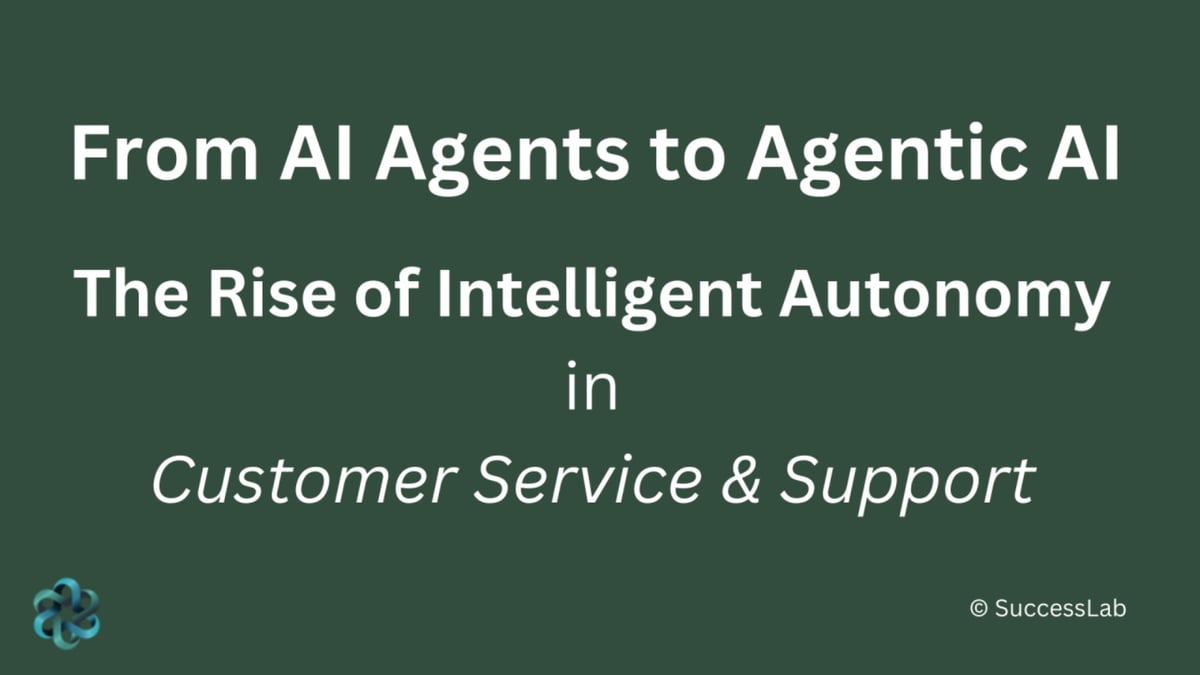From AI Agents to Agentic AI: The Rise of Intelligent Autonomy

Omid Razavi
February 21, 2025
Artificial Intelligence is no longer just about executing predefined tasks—it’s evolving into something much more powerful. As businesses embrace automation in customer service and support, a critical distinction emerges between AI Agents and Agentic AI. While both play crucial roles in improving efficiency and customer experience, their capabilities, autonomy, and impact differ significantly.
Understanding this distinction is essential for organizations looking to enhance customer interactions, optimize service operations, and drive long-term success. Let’s explore how AI Agents function today and how Agentic AI represents the future of intelligent automation in customer support.
AI Agents: Task-Specific Performers in Customer Service
AI Agents are designed to perform well-defined tasks within a controlled environment. They follow predefined workflows, respond to inputs, and execute commands efficiently—but within a limited scope. These agents are widely used in customer service operations to automate repetitive tasks and provide quick responses.
Key Characteristics of AI Agents:
- Autonomy: Operates independently within predefined parameters.
- Perception: Senses and interprets structured inputs like customer queries.
- Reactivity: Respond to customer requests without deeper strategic reasoning.
- Task-Specific: Excels in handling predictable, workflow-driven support functions.
Agentic AI: The Next Frontier of Intelligence in Customer Success
Agentic AI takes automation a step further. It goes beyond predefined workflows and operates with higher autonomy, adaptability, and strategic decision-making levels. These systems can learn, reason, and make complex decisions independently, making them invaluable for dynamic customer service environments.
Key Characteristics of Agentic AI:
- Autonomous Decision-Making: Analyzes customer needs and executes multi-step solutions independently.
- Goal-Driven Intelligence: Plans and adapts actions based on customer history and business objectives.
- Continuous Learning: Improves over time by analyzing interactions and customer feedback.
- Advanced Reasoning: Coordinates across multiple support channels and backend systems.
The Agentic AI Myth: Slapping AI on a Workflow Doesn’t Make It Agentic
Many vendors today claim their solutions are Agentic AI, but most are simply AI Agents wrapped in a layer of automation. If an AI system is merely making decisions based on predefined workflows—without true autonomy, learning, or adaptability—it does not qualify as Agentic AI.
Wherever AI is bolted onto an existing decision-making framework, it remains an AI Agent, not Agentic AI. Accurate agentic intelligence requires goal-driven reasoning, the ability to operate across domains, and the capability to independently adapt to new challenges—far beyond executing predefined workflows.
Key Differences Between AI Agents and Agentic AI in Customer Service
This comparison highlights the progression from AI Agents, which perform specific workflow or rule-based tasks, to Agentic AI systems demonstrating a higher degree of autonomy, adaptability, and complexity in customer service applications.

Both AI Agents and Agentic AI have a place in customer service and support, but their use cases differ significantly:
Examples of AI Agents in Customer Service and Support
These AI solutions excel at task-specific automation, following predefined workflows to enhance efficiency and streamline customer interactions.
- Automated Email Responses – AI agents categorize and respond to common customer emails, such as order status inquiries or password reset requests.
- AI-Powered Ticket Prioritization & Assignment – AI analyzes incoming customer issues, prioritizes them based on urgency and impact, and routes them to the right support agent.
- AI-Powered Troubleshooting Guides – Interactive virtual assistants that walk users through step-by-step troubleshooting for tech support issues.
- Real-Time Language Translation in Support Chats – AI translating live customer chats for multilingual support without human intervention.
- Social Media Monitoring Bots – AI scanning social media platforms for brand mentions and responding to real-time customer queries.
Examples of Agentic AI in Customer Service & Support
These AI systems operate with autonomy, adaptability, and proactive intelligence, continuously learning and optimizing customer interactions without relying on predefined workflows.
- AI-Driven Customer Success Managers (CSMs) – AI proactively monitors customer engagement and usage patterns to suggest personalized success strategies and prevent churn.
- Predictive Customer Retention Models – AI analyzes behavioral and transactional data to identify customers at risk of churn and automatically initiates personalized retention campaigns.
- Self-Healing IT Support Systems – AI detects and resolves software or network issues before users experience disruptions, minimizing downtime.
- Dynamic Knowledge Base Optimization – AI continuously updates and improves self-service knowledge bases based on customer inquiries and feedback.
- AI-Orchestrated Customer Journeys – AI autonomously designs and executes personalized customer engagement workflows based on behavior, history, and predicted needs.
Embracing the Future: The Shift Toward Agentic AI
As AI technology advances, customer service organizations will evolve from predefined workflows to intelligent, autonomous systems capable of proactive engagement and complex decision-making. This transformation is not just an upgrade—it’s a fundamental shift in how businesses interact with customers and with one another, solve problems, and optimize operations.
Agentic AI will redefine customer service by moving beyond reactive automation to strategic, self-improving intelligence. These systems will anticipate and resolve issues before they arise, personalize interactions, drive efficiency, and continuously adapt to changing business needs.
However, this evolution comes with new challenges—including governance, ethical considerations, and the need for seamless human-AI collaboration. Businesses must balance automation with accountability, ensuring AI-driven decisions align with corporate values, customer trust, and regulatory frameworks.
The question is no longer if businesses will adopt Agentic AI but how fast they can embrace it to maintain a competitive edge in an increasingly AI-driven world.
This isn’t just the next step in AI—it’s a whole new playing field. Are we ready? 🚀
Subscribe to the CCO Perspectives newsletter and join the CSS Communities on LinkedIn to explore the latest innovations in AI for Customer Service and Support.
Let’s continue the conversation and shape the future of intelligent customer customer service and support together!
Like
Comments (0)
Popular

